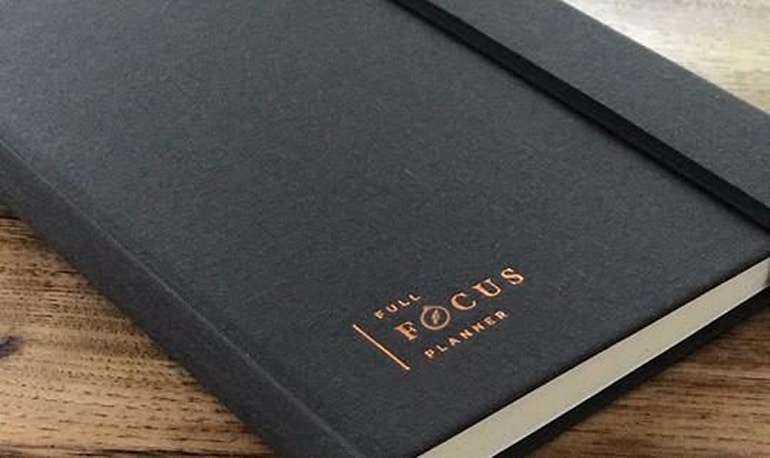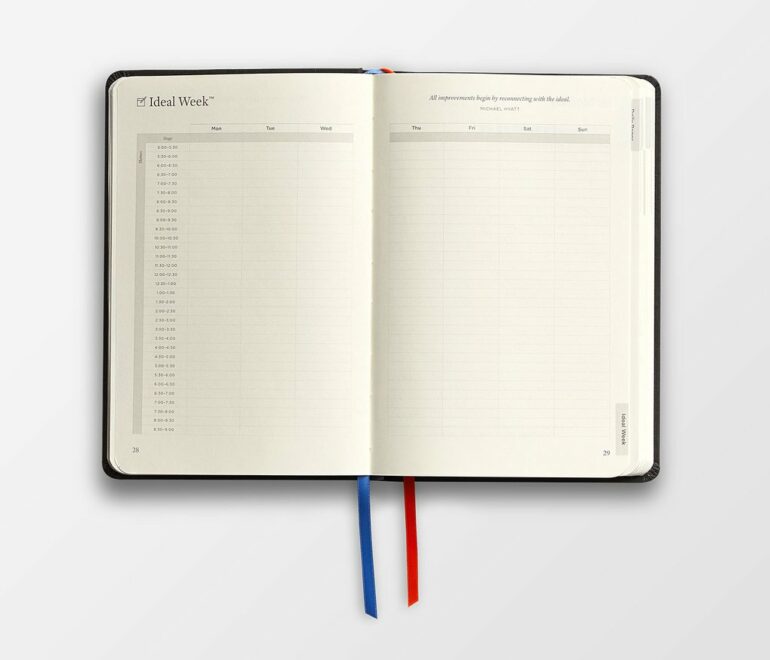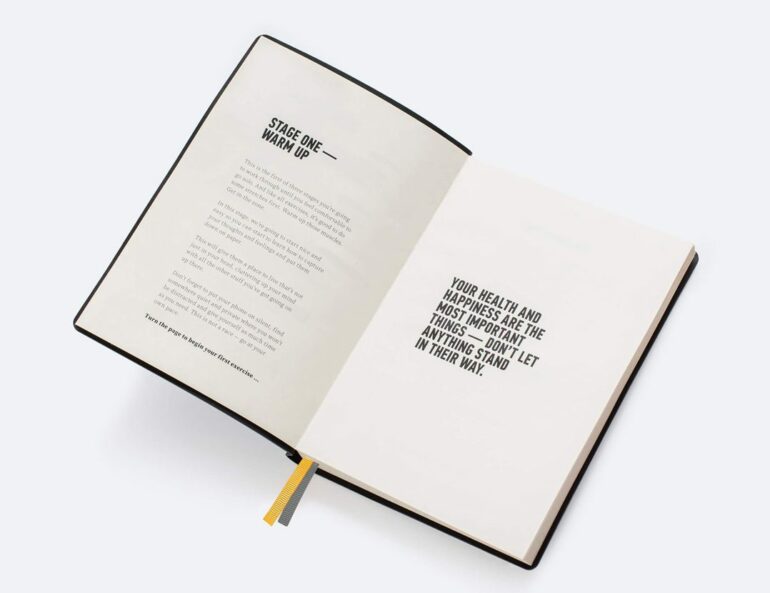Balancing your work and your life is not about numbers. It is not about scheduling and to-do listing and GTDing yourself into some kind of out-of-office bliss fest. It is about developing the inner you as passionately as you develop the professional you. And journaling could be the best tool you have to find that balance.

Table of contents
You’re grinding through a serious document, your mind churning out words a mile a minute, a frigid Diet Coke at the ready, when one of those irritating information lozenges slides into your screen on the upper right. “Work-Life Balance Important to Well-Being” comes at you in bold capitals. There’s a tiny image of a serene person surrounded by plants, sitting at a perfectly clean desk. Smiling. You slam your Diet Coke and yell out, “I’m balanced when I’m moving, loser!” To the dark. At 3 a.m. on a Saturday.
The Grind Is Killing People Every Day
Not just by dropping dead in the break room. Sure, that happens, but there are other deaths less dramatic. The kind that sneaks up on you. The kind where you’re in your mid-50s and realize you don’t have many friends, haven’t talked to your family in six months, and can’t remember the last book you read that didn’t have “law” in the title.
It’s Not a Meme: Balancing Work and Life Does Matter
Here’s a simple analogy about why work-life balance is crucial.
The more you neglect to build an inner life in favor of grinding through case files, the more that inner life fades and the closer you come to being all shell. Without a vibrant, rich interior to support it, that shell is fragile. To build that rich interior, you have to spend time with yourself.
You could take up running, getting your body out of the office and onto a trail to get your head out of the game. But there’s a chance you’ll spend that time going over your work, which may help you burn calories as you run faster and faster to get away from [endless screaming].
You could turn to yoga. You could read. You could learn to cook a nice steak Diane.
None of those, however, really address the fundamental practice of building an inner life: talking to yourself.
Journaling Keeps You Tuned in to Your Own Radio
Writing your thoughts down on paper gets them out of your head where you can see them. At first, your journal is going to be a mess. But eventually, it will turn into a daily practice you can’t wait for. Over time, you may reignite a sense of self you’d lost to your to-do list. And you may discover a few things about yourself you’d forgotten. You might even start getting better at your job.
Three Guided Journals to Assist You
Jumping into journaling isn’t easy for everyone. You might want guidance. I spent a year testing work-life-balance and guided journals. Here are three I feel are really good at taking you along one of the important paths to a vibrant personal and professional zen. (Note: Find more journal options in our lawyer gift guide and in Attorney at Work’s store.)

1. The Full Focus Planner Will Make You Fully Productive
Michael Hyatt is a consultant to megastar CEOs. Recently, he developed a planner system that helps professionals look past the small victories of daily work toward the slow and graceful improvements one can achieve by looking at their long-term goals, habits and free time.
At first glance, the Full Focus Planner may seem intimidating. It’s expensive. It’s cloth-bound. It’s got a lot of sections and tools. Reading Hyatt’s popular book “5 Days to Your Best Year Ever” or understanding his “Free to Focus” method might be helpful, but they aren’t required. Hyatt’s made very clear video tutorials to help you get up and running.

The Full Focus Planner teaches you to build useful habits and develop good rituals. The daily pages have two checkboxes at the top so you can track your morning ritual and your work startup routine. There are two more checkboxes at the bottom for your end-of-day shutdown and evening ritual. Which might lead you to ask what the hell a morning and evening ritual is, which might lead you to Google “evening ritual,” which will leave you with a lot of questions about chickens and goats and hooded robes. But look, that’s not what Hyatt means.
Your morning ritual is your daily habits prior to working. Brushing your teeth. Getting coffee. Doing yoga. Shouting at innocent bystanders (just me?).
Your evening ritual is the opposite mode: Brushing your teeth, choosing exactly the right silk pajamas, reading a good book in bed before falling asleep.
Which brings up Hyatt’s unique spotlight on sleeping. The Full Focus Planner makes a point of directing you toward a healthy sleep schedule. Hell, the damn thing has a spot for planning your naps on the weekend.
If you’re planning your weekend naps on Monday, then your ballet of work-life balance is at the Baryshnikovian level and, also, can I come work for you?
Hyatt’s planner is effective for a lot of reasons, but its greatest gift is right there in the title: Full Focus. By concentrating on long-term goals every day, you don’t lose sight of the efforts required to achieve them. By making personal time as much a priority as professional work, and by keeping you thinking about that, the journal helps you develop a sense of division: “Work goes here. Rejuvenation goes here.”
Finally, the design is user-friendly, easy to understand and looks pretty sharp.

2. The Monk Manual Will Guide You Into Serenity
This journal is theoretically designed to help the user develop the daily habits of a studious, devoted monk. It is quite upfront about its theological component, which could be a problem for some. But a journal is private, so the spiritually oriented work in the Monk Manual is protected by the social contract of not reading people’s !@#$% journals.
Your Monk Manual arrives with gifts. There’s a nice pocket notebook, a welcome letter signed by founder Steve Lawson, and a heavy, square card. On one side you will find a four-point quick start guide and a QR code that opens video tutorials. On the other is a postcard to your future self. On it, you commit to using the manual for 60 days and write down your specific long-term goal — plus the name of someone you can reach out to if you get sidetracked. The card is designed to fit into a pocket in the back of the manual so you can check it anytime.
The Monk Manual is most useful to people for whom a work-life balance means a centered, spiritual interior life.

3. The MindJournal Will Help You Plumb Your Emotional Depths
The MindJournal is marketed to men. Since the text often addresses men directly, if your chromosomes don’t have a Y it might get irritating. Otherwise, it’s a fine tool for developing the habit of talking to yourself on paper.
The MindJournal asks daily questions meant to get you into the habit of exploring your emotions, stating your intentions, showing gratitude and finally enjoying a little time that’s entirely about you. However, those are all short sections. The real value comes in its program of prompts designed to tap your keg of self-evaluation and purposeful reflection.
This series of questions is divided into three parts, each successively more probing:
- The first one: Describe your day.
- Deeper into the manual: Who’s got your back?
- Finally, there are no more questions; the rest is blank pages. At this point, the designers assume you’ve pumped up your scribbling muscles and can Marcus Aurelius yourself on paper without being goosed.
At first, I found the MindJournal lightweight. I’m rocking four or five journals every day, keep a reading diary as I plow through the classics and do a bullet journal for weight loss. I’m used to pouring my feelings onto reams of paper using barrels of ink. But I’m not the MindJournal’s target market. That would be emotionally reticent men who want to build a more meaningful interior life. Men who do not journal but recognize it might be valuable. For those men, this journal is perfect.
“MindJournal is on a mission to bring back the legacy of guys keeping a journal,” says co-founder Ollie Aplin. “Years ago, the idea of any man sitting and jotting down his thoughts was commonplace. Over the years this has sadly been lost. And with it has come an epidemic failure to provide men with the necessary tools to cope with modern-day life.”
What I took as lightweight is really a carefully crafted series of thoughtful questions written to inspire new journalers to write about themselves. The questions speak to a broad variety of personalities, so they are written in a general tone. But their effect is to ignite a fire of self-discovery, probably for a newly philosophical man in his 30s, not a crusty old curmudgeon who’s [deleted] years old.
Journaling: It Worked for Twain, Einstein and Darwin
There are many, many structured journals. I selected the three above based mostly on my wingnut tendencies and because they represent typical examples. I passed up a lot of great products, like the journal from the Daily Stoic and the Clear Habit Journal from Baron Fig.
Ultimately, journaling in almost any capacity is helpful for developing balance. Even a blank journal with no structured guidance. Just you, pouring your heart out on paper is deeply effective. It worked for Twain and Einstein and Darwin. It’ll work for you.
Read more Analog Attorney here.
Illustration ©iStockPhoto.com
Disclosure: While we may receive a small affiliate fee for some of these links, commissions or fees earned from partners such as Amazon do not affect our recommendations. Thank you for supporting our sponsors and affiliates.
Wait … You Don’t Get Our Daily Newsletter?
Get really good ideas every day for your law practice: Subscribe to the Daily Dispatch (it’s free). Follow us on Twitter @attnyatwork.

















